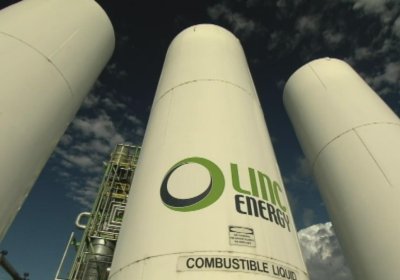Queensland Natural Resources and Mines minister Anthony Lynham announced on April 18 that the government has banned underground coal gasification (UCG) in the state, arguing the environmental risks outweigh the economic benefits.
He said the ban, which would apply immediately as government policy, would be legislated by the end of the year.
Underground coal gasification involves converting coal to a synthesised gas by burning it underground. The syngas is processed on the surface to create products such as aviation fuels and synthetic diesel.
Gas
Concerned residents gathered outside Lismore City Council on April 19 as the NSW Planning Department briefed council on the Draft North Coast Regional Plan.
Spokesperson for Gasfield Free Northern Rivers, Dean Draper said: “They should be offering a community briefing in Lismore so we can clearly send our message that this regional plan must be amended to remove the current references to CSG. As well as this removal we are demanding that the plan clearly spells out that there will be no unconventional gas exploration at all for the life of the plan.
Activists from Stop CSG Sydney and the Australian Student Environment Network toured the AGL Camden CSG gasfields on April 17 to see for themselves how close gas wells are to homes. AGL has promised to end gas mining in Camden by 2023. Residents want them shut down now.
The NSW government has said that gas wells cannot be drilled within two kilometres of homes, but it is happy for Landcom, the government's own developer, to sell house and land packages within a few hundred metres of major gasfields.
 Protest by members of the Wer'suwet'en First Nation against tar sands oil pipelines.
Ian Angus is a Canadian ecosocialist activist and author. The editor of Climateandcapitalism.com, Angus is also the co-author of Too Many People? Population, Immigration, and the Environmental Crisis with former Green Left Weekly editor Simon Butler (Haymarket, 2011).
Protest by members of the Wer'suwet'en First Nation against tar sands oil pipelines.
Ian Angus is a Canadian ecosocialist activist and author. The editor of Climateandcapitalism.com, Angus is also the co-author of Too Many People? Population, Immigration, and the Environmental Crisis with former Green Left Weekly editor Simon Butler (Haymarket, 2011).
The Illawarra Knitting Nannas Against Gas (I KNAG), held a "knit-in", in Edgecliff in Sydney, at the office of Prime Minister Malcolm Turnbull on March 21.
He was not there and had not answered the two simple questions the Nannas had left him earlier. “Do you support a ban on coal seam gas (CSG) mining in drinking water catchments?" and “Would you move federal legislation to enact a ban on CSG mining in drinking water catchments?”
Slick Water: Fracking – and One Insider’s Stand Against the World’s Most Powerful Industry
Andrew Nikiforuk
Greystone Books/David Suzuki Institute
2015, 350 pages
The fracturing of rocks to mine more fossil fuels was born with the oil business, writes the Canadian journalist, Andrew Nikiforuk, in Slick Water.
During the world’s first oil boom in Pennsylvania in the 1850s, highly volatile nitro-glycerine and other explosives were used on sluggish wells with lethal risk, to turn them into gushers by creating new fractures to channel blocked oil to the surface.
Linc Energy will stand trial on five charges that it breached Queensland's environmental laws at its underground coal gasification site.
The Department of Environment and Heritage Protection (DEHP) has accused the company of wilfully causing serious harm at its trial site near Chinchilla on the Darling Downs.
 "This is a law to protect the rich. We will need to break these laws to protect our democratic rights," Aboriginal activist and lead NSW Senate candidate for the Socialist Alliance team in the federal elections Ken Canning, said on March 15.
"This is a law to protect the rich. We will need to break these laws to protect our democratic rights," Aboriginal activist and lead NSW Senate candidate for the Socialist Alliance team in the federal elections Ken Canning, said on March 15.
Experts have laughed at a prediction by the environment minister Greg Hunt that Australia’s greenhouse gas emissions peaked 10 years ago.
Hunt told the ABC’s AM program: “I believe that we have reached what is sometimes known as peak emissions. In my best judgment … we reached peak emissions in 2005-06 ... and the course of history to come for Australia is that we will continue to be below that figure.”
Experts have laughed at a prediction by the environment minister Greg Hunt that Australia's greenhouse gas emissions peaked 10 years ago.
The NSW Minerals Council chief executive Stephen Galilee is keen on new anti-protest laws in NSW. He claims to be concerned about the safety of the workers as well as the protesters “illegally accessing mine sites”.
Mining and Energy Minister Antony Roberts has been a little more blunt: he says the new law is aimed at better enforcing the protection of private property and “lawful business activity”.
Most, however, can see through the spin.
The powers-that-be in NSW have deemed that there are so many examples of “unsafe protest activities” across the state that, to make everyone safe, we need new laws that will protect “lawful business activity”.
Protesters will be able to be jailed for up to seven years for “intentionally” or “recklessly” interfering with a “mine” — the definition of which has been changed to include an exploratory or test site.
Rob Pyne (MP) is now the independent Member for Cairns in the Queensland Parliament, following his shock resignation from the Australian Labor Party on March 7.
Pyne was a student leader at James Cook University, then served on the Cairns Regional Council between 2008 and 2015 before becoming Australia's first quadriplegic member of parliament in last year's Queensland state election.
- Previous page
- Page 12
- Next page









